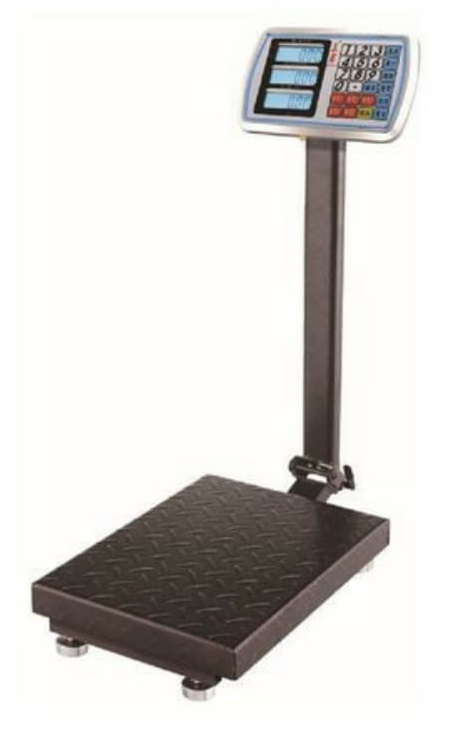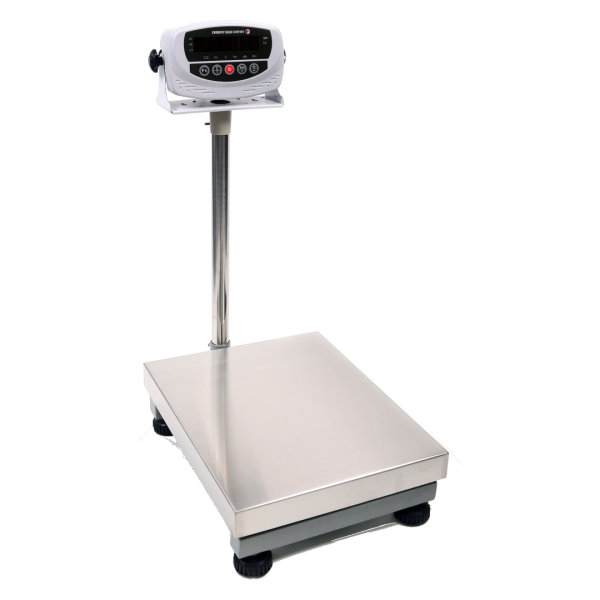Just How Industrial Scales Work: A Comprehensive Review for New Users
Recognizing the technicians behind commercial ranges is critical for new customers that want to make certain accuracy in their dimensions. As we discover these elements, one should think about how these elements communicate to improve performance in varied industrial applications.
Fundamentals of Industrial Scales
Industrial ranges are necessary devices used throughout numerous fields, including production, logistics, and agriculture, to make certain exact weight measurements of hefty tons. The fundamental principle behind industrial scales includes the conversion of weight into a measurable form that can be presented electronically or analogically. These ranges use different systems, such as load cells or mechanical levers, to identify the weight of items placed upon them.

In enhancement to their measurement capacities, industrial scales are developed to endure rough environments, including robust construction that stands up to dirt, wetness, and heavy effects. Calibration and upkeep are essential to make sure precision, as also minor discrepancies can lead to considerable economic effects. By recognizing the basics of commercial ranges, customers can appreciate their importance in different commercial applications.
Sorts Of Industrial Scales
Numerous sorts of industrial scales accommodate the diverse requirements of different sectors, each designed to take care of certain evaluating jobs with precision and reliability. Amongst one of the most common types are floor ranges, which are perfect for weighing hefty and large things. These scales usually include huge systems and can suit palletized goods, making them essential in stockrooms and shipping facilities.
One more type is bench ranges, which are typically made use of for smaller sized items in manufacturing and retail setups. They provide exact measurements for items that call for precision, such as chemicals or components in production line (Industrial Scales). For mobile procedures, portable ranges use flexibility and ease of transport, appropriate for fieldwork or temporary setups
Furthermore, specialized scales like checkweighers are made use of in production lines to preserve quality control by making certain that products meet weight specifications. Each type of industrial range plays an important role in improving functional performance and precision throughout different industries.
How Evaluating Devices Job
Considering devices are crucial parts that make it possible for precise dimension of mass throughout different industrial scales. These mechanisms use various concepts of physics and design to supply specific weight analyses, vital for supply monitoring, high quality control, and compliance with regulative standards.
One typical kind of considering device is the load cell, which runs on the principle of pressure evaluates. When a load is applied, the tons cell warps somewhat, creating an electrical signal symmetrical to the weight. This signal is after that exchanged an understandable weight dimension by the scale's electronic devices.
Another extensively used system is the mechanical balance, which uses a system of levers and weights. Industrial Scales. This technique depends on the concept of stability, where the weight of the item being determined is balanced against known weights, permitting direct measurement
Additionally, pneumatic and hydraulic scales take advantage of liquid characteristics concepts to gauge weight. These systems use the stress exerted by a tons to identify weight, providing high accuracy for substantial lots.
Proper Use Strategies
When utilizing commercial ranges, sticking to proper usage methods is important for making certain exact dimensions and keeping tools honesty. Primarily, it is necessary to useful link pick the appropriate scale for your particular application, as ranges differ in ability and accuracy.
Before evaluating, ensure that the scale is positioned on a secure, level surface area free from vibrations or disturbances. This will certainly assist to minimize mistakes triggered by exterior aspects. In addition, calibrate the scale according to the maker's specs prior to utilize, making certain that it is working correctly.
When putting products on the scale, distribute the weight equally to avoid tipping or harming the tools. Constantly permit the range to maintain prior to recording the weight, as changes may happen throughout initial placement. For bulk products, use containers that are proper for the scale size to avoid overloading.
Furthermore, prevent placing cool or overly warm items straight on the range, as temperature level variations can affect accuracy. Lastly, maintain the considering system tidy and free of particles to avoid contamination and make certain trusted outcomes. By following these strategies, individuals can take full advantage of the performance and durability of their commercial scales.
Maintenance and Calibration Tips
Making sure the longevity and accuracy of commercial ranges requires thorough maintenance and routine calibration. A preventive upkeep schedule is vital; it ought to include regular evaluations to recognize wear and tear, specifically on lots cells and other sensitive parts. Regularly cleaning the range's surface area and ensuring the bordering location is without debris will help maintain its stability and performance.
Calibration is equally essential and must be done at normal intervals or whenever the scale experiences substantial changes in temperature level, moisture, or physical displacement. Use licensed calibration weights that are deducible to nationwide standards for precision. Paper each calibration session carefully to track performance with time and recognize any trends or recurring concerns.
Additionally, bear in mind the scale's setting. Avoid positioning it near resources of resonance, electromagnetic interference, or severe temperatures, as these variables can adversely impact measurements. Finally, train all drivers on appropriate range use and maintenance methods to make sure constant efficiency and accuracy. By sticking to these upkeep and calibration pointers, customers can improve the integrity of their industrial scales, making certain optimal operation in any setting.
Conclusion

Understanding the technicians behind commercial ranges is critical for new individuals who desire to make certain precision in their measurements.Industrial ranges are important devices used throughout numerous industries, consisting of production, logistics, and agriculture, to Home Page ensure accurate weight dimensions of heavy tons. The essential concept behind industrial scales entails the conversion of weight into a measurable type that can be shown electronically or analogically. By understanding the fundamentals of industrial ranges, individuals can appreciate their relevance in different industrial applications.
In final thought, comprehending the procedure and upkeep of industrial scales is important for guaranteeing precise weight dimensions in different applications. (Industrial Scales)
Comments on “The Benefits of Investing in High-Quality Industrial Scales for Heavy Weighing”